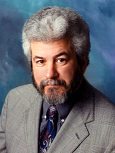 I suppose there are times when you're at your wit's end.
I suppose there are times when you're at your wit's end.
It's been no less than an exhausting and frustrating day at work. You
walk in the door, and while taking off your coat, you notice your home
not quite the way you left it 8 hours ago. Your afternoon sitter
seems to be fleeing the scene (you don't blame her) as assorted
crayons, toys and scattered pots and pans catch your eye - tell-tale
signs of "terrible twos" and a mischievous action-packed day. There's
no time to unwind or clean up now, as you begin preparing dinner
that's already behind schedule. Then, like radar, he senses you're
home.
Suddenly you're pounced upon by a 35 lb. ball of energy who just
emerged from a recharging nap. And all he wants to do is play and
guard your absolutely undivided attention until he's out of steam
again - though it might take 'til midnight.
Even at 2, he knows how to pull your strings. Upon sensing your
slightest divergence from him as your sole focus, the noise and chaos
only a 2-year-old can muster begins to rapidly and progressively
accelerate.
As the tension builds, your temples tighten to a dull aching throb and
your fuse rapidly shortens. Yet rather than exploding or coming apart
at the seams, you take a deep breath and proceed to the medicine
cabinet. Yet it's not Tylenol you're after - it's an antidepressant.
You remove a pill from the childproof container, fill a glass with
water, sit down on your bed and place the pill - in your child's
mouth!
While you probably related to this story initially, the surprise twist
at the end isn't a product of fiction. According to a recent study in
the Journal of the American Medical Association (JAMA), there is a
shocking rise in the use of stimulants, Ritalin, antidepressants and
other antipsychotic drugs in 2- to 4-year-olds. According to Julie
Magno Zito, University of Maryland pharmacologist, and the study's
principal investigator, these findings aren't altogether surprising.
An article published in 1994 cited by the investigators disclosed 3000
Prozac prescriptions for children under the age of 1.
Frankly I'm not surprised, yet I am disgusted.
As a neurologist, I'm having great difficulty grasping the medical
rationale behind these prescriptions. Let's take a moment to focus on
Attention Deficit Disorder. Are not all toddlers poorly focused and
distractible? Doesn't every toddler have a short attention span?
Isn't evolving sensory input and recognition likely to overwhelm any
child? Isn't this "normal" behavior?
If you don't agree, just watch any 1-2-year-old walking down the
street. That child sees every furrow in the sidewalk, every weed
growing through the cracks, everything and I mean "everything" that
moves including ants, bugs, leaves and the like. What I'm describing
is no less than the magic of childhood¾ to be fully aware, carefree
and so open to all that exists.
I've also observed children who have the ability to read by the age of
3. Such precocious feats often convince parents they're blessed with
a budding genius. All signs point in that direction especially when
the supposed prodigy is compared with other children in kindergarten
and first grade. Yet by age 7, many of these kids seem to settle into
mediocrity¾ an enormous letdown for proud parents. Some actually
receive neurological consultations to determine the medical basis for
such a performance decline. The results, however, are often not what
the parents want to hear. Simply stated, the other children caught
up.
So if a toddler can't sit still long enough to learn the alphabet or
to read, should we place him/her on Ritalin because we expect more?
Should we prescribe antidepressants for 3-year-olds who demonstrate
attention-getting behaviors like acting up, being uncooperative or
pouting? Should we attempt to shape a child's behavior with drugs
because we don't have time for proper parenting?
If you've answered "yes" to any of the above questions, I
can tell you where the problem lies, and it's not with your child.
It's time we as a society realize that children are simply children.
They need abundant attention, nurturing and love even when it's
inconvenient for us. While rare exceptions do exist, drug therapy
used to control behavior in toddlers is a poor reflection on our
society and the medical profession.
To simplify matters greatly, consider the following: Childhood is
special. Children are gifts from God. We are responsible. Next time
your 2-year old acts up, try a hug instead of a drug - Mind Over Matter!
© 2000 Barry Bittman,
MD all rights reserved
Barry Bittman, MD is a neurologist, author, international speaker, inventor and researcher. He is the CEO and Director of the Mind-Body Wellness Center, 18201 Conneaut Lake Road in Meadville, phone (814) 724-1765, fax (814) 333-8662, www.mind-body.org.
Contact Dr. Bittman